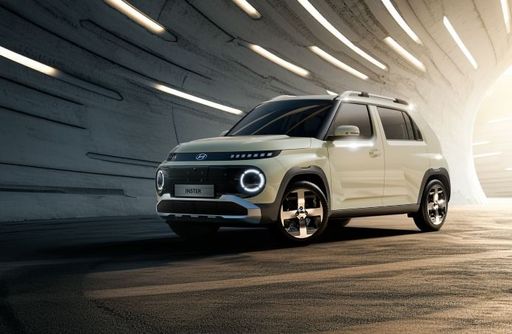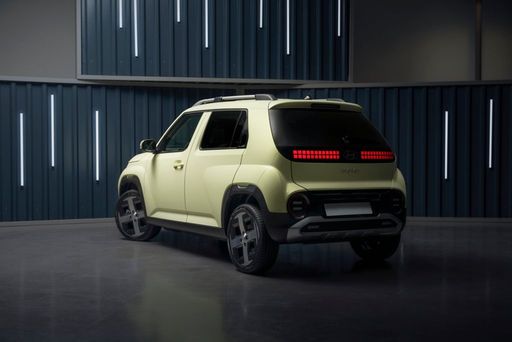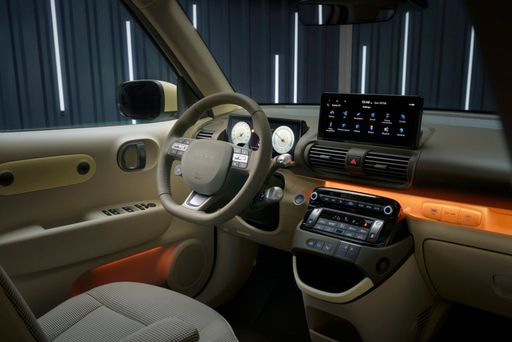Fiat Scudo VS Hyundai Inster – Specs, Efficiency & Price Comparison
Which model is the better choice – the Fiat Scudo or the Hyundai Inster? We compare performance (180 HP vs 115 HP), boot capacity ( vs 280 L), efficiency (23.60 kWh6.50 L vs 14.30 kWh), and of course, the price (27600 £ vs 20500 £).
Find out now which car fits your needs better!
The Fiat Scudo (Cargo Van) is powered by a Diesel or Electric engine and comes with a Manuel or Automatic transmission. In comparison, the Hyundai Inster (SUV) features a Electric engine and a Automatic gearbox.
When it comes to boot capacity, the Fiat Scudo offers , while the Hyundai Inster provides 280 L – depending on what matters most to you. If you’re looking for more power, you’ll need to decide whether the 180 HP of the Fiat Scudo or the 115 HP of the Hyundai Inster suits your needs better.
There are also differences in efficiency: 23.60 kWh6.50 L vs 14.30 kWh. In terms of price, the Fiat Scudo starts at 27600 £, while the Hyundai Inster is available from 20500 £.
Compare all the key specs now and find out which model fits your lifestyle best!
Fiat Scudo
The Fiat Scudo stands out as a versatile and practical choice for those in need of a reliable van, offering a blend of comfort and functionality. Its design is focused on meeting the demands of both urban and long-distance driving, ensuring a smooth and responsive experience. With a spacious interior and robust build, the Scudo is tailored for diverse professional needs, making it a valued asset for businesses and individuals alike.
detailsHyundai Inster
The Inster has quickly captured the attention of automotive enthusiasts with its striking design and dynamic performance. This model seamlessly blends advanced technology with comfort, making it an ideal choice for both daily commutes and adventurous road trips. With its spacious interior and innovative features, the Inster promises an exhilarating driving experience that doesn’t compromise on practicality.
details @ hyundai.news
@ hyundai.news
 @ hyundai.news
@ hyundai.news
 @ hyundai.news
@ hyundai.news

|
|
|
|
|
Costs and Consumption |
|
|---|---|
|
Price
27600 - 49300 £
|
Price
20500 - 25800 £
|
|
Consumption L/100km
6.5 - 7.8 L
|
Consumption L/100km
-
|
|
Consumption kWh/100km
23.6 - 27 kWh
|
Consumption kWh/100km
14.3 - 15.1 kWh
|
|
Electric Range
218 - 352 km
|
Electric Range
327 - 370 km
|
|
Battery Capacity
-
|
Battery Capacity
42 - 49 kWh
|
|
co2
0 - 205 g/km
|
co2
0 g/km
|
|
Fuel tank capacity
69 - 70 L
|
Fuel tank capacity
-
|
Dimensions and Body |
|
|---|---|
|
Body Type
Cargo Van
|
Body Type
SUV
|
|
Seats
2 - 6
|
Seats
4
|
|
Doors
4
|
Doors
5
|
|
Curb weight
1616 - 2260 kg
|
Curb weight
1380 - 1433 kg
|
|
Trunk capacity
-
|
Trunk capacity
238 - 280 L
|
|
Length
4609 - 5330 mm
|
Length
3825 - 3845 mm
|
|
Width
1920 mm
|
Width
1610 mm
|
|
Height
1881 - 1935 mm
|
Height
1575 - 1610 mm
|
|
Payload
840 - 1805 kg
|
Payload
317 - 357 kg
|
Engine and Performance |
|
|---|---|
|
Engine Type
Diesel, Electric
|
Engine Type
Electric
|
|
Transmission
Manuel, Automatic
|
Transmission
Automatic
|
|
Transmission Detail
Manual Gearbox, Automatic Gearbox, Reduction Gearbox
|
Transmission Detail
Reduction Gearbox
|
|
Drive Type
Front-Wheel Drive
|
Drive Type
Front-Wheel Drive
|
|
Power HP
100 - 180 HP
|
Power HP
97 - 115 HP
|
|
Acceleration 0-100km/h
10.5 - 11.2 s
|
Acceleration 0-100km/h
10.6 - 11.7 s
|
|
Max Speed
130 - 185 km/h
|
Max Speed
140 - 150 km/h
|
|
Torque
260 - 400 Nm
|
Torque
147 Nm
|
|
Number of Cylinders
4
|
Number of Cylinders
-
|
|
Power kW
74 - 132 kW
|
Power kW
71 - 85 kW
|
|
Engine capacity
1499 - 2000 cm3
|
Engine capacity
-
|
General |
|
|---|---|
|
Model Year
2022 - 2024
|
Model Year
2025
|
|
CO2 Efficiency Class
F, G, A
|
CO2 Efficiency Class
A
|
|
Brand
Fiat
|
Brand
Hyundai
|
Fiat Scudo
The Versatile Fiat Scudo: A Comprehensive Overview
The Fiat Scudo has long been a staple in the light commercial vehicle market, combining practicality with Italian flair. With its recent updates, the Scudo continues to impress, offering a range of configurations to suit various business needs. Whether you're looking for a reliable diesel workhorse or an eco-friendly electric option, the Scudo has you covered. Let's delve into the technical details and innovations that make the Fiat Scudo a standout choice.
Powertrain Options and Performance
The Fiat Scudo offers a diverse range of powertrains to cater to different user preferences and requirements. The diesel variants are equipped with the robust Multijet engines, available in 1.5-litre and 2.0-litre capacities. These engines produce between 100 - 180 PS, offering a balance between power and fuel efficiency, with consumption rates ranging from 6.5 to 7.8 L/100 km.
For those seeking greener alternatives, the E-Scudo provides two battery options: a 50 kWh and a 75 kWh version, both delivering an output of 136 PS. The electric models boast an impressive range of 218 to 321 km, depending on the battery size, making them an excellent choice for urban logistics while significantly reducing the carbon footprint.
Transmission and Drivetrain Technologies
The Fiat Scudo offers both manual and automatic transmission options, allowing drivers to choose based on their preferences and driving conditions. All models come with front-wheel drive, ensuring a stable and efficient distribution of power. The automatic gearbox in the diesel variants is particularly noteworthy for its smooth gear shifts and enhanced driver comfort, while the manual option provides more control for those who prefer a hands-on driving experience.
Innovative Features and Design
The Scudo is designed not only for utility but also comfort and ease of use. Its exterior dimensions range from 4609 to 5309 mm in length, offering substantial cargo space while maintaining a manageable size for city driving. The interior, available in several configurations, accommodates two to five seats, providing flexibility for transporting goods or passengers.
Innovative features include a modern infotainment system, ergonomic seating, and advanced safety technologies. The Scudo's cabin is equipped with intuitive controls and connectivity options, allowing drivers to maintain productivity and stay connected while on the move.
Economical and Environmental Considerations
The Fiat Scudo is designed with both performance and eco-friendliness in mind. The diesel engines are equipped with start-stop technology to reduce emissions and fuel consumption, achieving CO2 efficiency ratings ranging from F to A, depending on the model. This makes the Scudo not only an economical choice for businesses but also a responsible choice for the environment.
The electric E-Scudo takes eco-conscious driving to the next level, producing zero tailpipe emissions and offering various charging options to accommodate different usage patterns, making it suitable for both urban and suburban applications.
Conclusion
The Fiat Scudo stands out as a versatile and robust option in the light commercial vehicle market. With its diverse range of powertrains, including efficient diesel and innovative electric options, it caters to various business needs without compromising on performance or sustainability. The Scudo's well-thought-out design, coupled with its advanced features, make it a reliable partner for businesses looking to enhance their logistics operations.
Hyundai Inster
The automotive landscape continues to evolve, and at the forefront of this transformation is the Hyundai Inster, a dynamic model set to impress electric vehicle enthusiasts. As a compact SUV, the Inster embodies a blend of innovative technology, user-friendly features, and an eco-conscious design, making it a contender in the burgeoning electric vehicle market.
Powertrain and Performance
The Hyundai Inster is powered by an efficient electric drivetrain, offering two main battery options: a 42 kWh and a 49 kWh version. These options translate to power outputs of 97 HP and 115 HP, respectively, allowing drivers to choose based on their performance needs. The Inster accelerates from 0 to 100 km/h in 11.7 seconds for the 42 kWh variant, while the more powerful 49 kWh model reaches the same speed in an impressive 10.6 seconds, showcasing Hyundai's commitment to delivering engaging performance.
Range and Efficiency
One of the standout features of the Inster is its electric range. The 42 kWh model provides a range of 327 km, while the 49 kWh variants extend the range to 360 km and 370 km. This remarkable efficiency is complemented by consumption figures of 14.3 kWh/100 km for the 42 kWh variant and 14.9 kWh/100 km for the 49 kWh options. These figures ensure that the Inster is not only suited for city driving but also capable of handling longer journeys with ease.
Dynamic Design and Comfortable Interior
Aesthetically, the Hyundai Inster boasts a sleek and modern look, featuring a compact SUV profile that is both sporty and practical. The dimensions, measuring between 3825 mm and 3845 mm in length, with a width of 1610 mm and heights ranging from 1575 mm to 1610 mm, contribute to its spacious and comfortable cabin. The interior accommodates up to four passengers, making it an ideal choice for small families or couples.
Innovative Features
The Inster incorporates advanced technology geared towards enhancing the driving experience. Its automatic transmission, utilizing a reduction gearbox, ensures seamless gear shifts. Additionally, drivers will appreciate the array of smart features designed for convenience and connectivity, including advanced infotainment systems and driver assistance technologies.
Sustainability Credentials
Hyundai is dedicated to sustainability, and the Inster is a testament to this philosophy. With a carbon footprint of zero emissions, the Inster falls into the A CO2 efficiency class, making it a responsible choice for eco-conscious consumers. The absence of traditional emissions positions the Inster not only as an economical option but also as a proactive step towards reducing our environmental impact.
Conclusion
The Hyundai Inster stands out as a versatile and innovative solution in the electric vehicle segment. With a balanced approach to performance, efficiency, and sustainability, it caters to the modern driver’s needs and reflects the automotive industry's shift towards electrification. The future looks bright for the Inster, as Hyundai continues to pave the way for greener driving experiences.
The prices and data displayed are estimates based on German list prices and may vary by country. This information is not legally binding.
